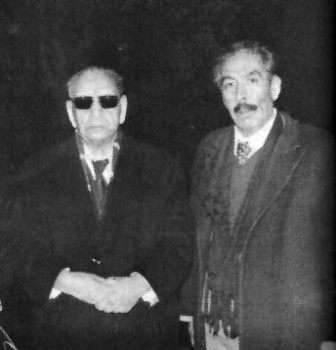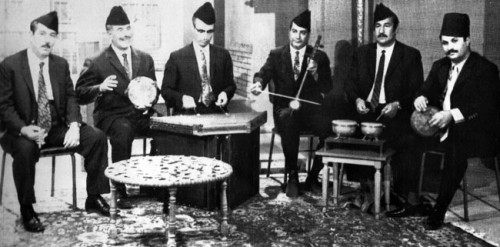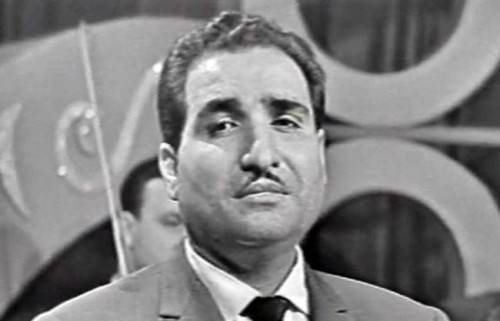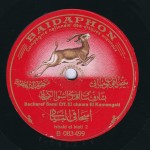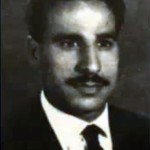The Arab Music Archiving and Research foundation (AMAR), in collaboration with the Sharjah Art Foundation (SAF), presents “Min al-Tārīkh”.
Dear listeners,
Welcome to a new episode of “Min al-Tārīkh”.
Today we will resume our discussion about al-ṭarīqa al-Qubbāngiyya and the followers of Mr Muḥammad al-Qubbāngī’s style with our guest Mr Husayn al-A‘zami.
Let us talk about Yūsuf ‘Umar.
Yūsuf ‘Umar…
As for the others I included in my book, we only need to mention their names. They are: ‘Abd al-Qādir al-Najjār, ‘Abd al-Raḥīm al-A‘ẓamī, and ‘Alī Rzūqī… and they all followed al-ṭarīqa al-Qubbāngiyya.
I did not include muṭrib Yūsuf ‘Umar in the book “Al-Ṭarīqa al-Qubbāngiyya” because I wrote about him in the book “Al-Arba‘a al-Kibār”.
That is a separate book… But in your opinion, he belongs to al-ṭarīqa al-Qubbāngiyya…?
Yes, of course, he belongs initially to al-ṭarīqa al-Qubbāngiyya.
I wrote about Yūsuf ‘Umar in several books because he deserves it. This great maqām muṭrib –born in 1918 and who died in 1986 of an incurable disease– relayed faithfully the heritage from his predecessors to those who came after him without adding or removing anything. This is what distinguishes him, added to the fact that he conveyed through his voice, in his performance of Iraqi maqām-s, unprecedented pure Baghdadi expressiveness.
Yūsuf ‘Umar was granted the title of “Pioneer of Popular Iraqi maqām Singing” when I was the Director of the “Houses of Iraqi maqām” and he is the only Popular muṭrib in Iraq until today. The public in Iraq knows him –though he is more famous inside Iraq than outside Iraq– including the young and the old, women and men… and may even not know any other singer. He is the most famous local maqām muṭrib in Iraq with overwhelming and popular/public fame. So we gave him the title of “Pioneer of Popular maqām Singing”.
I have a question: You consider Yūsuf ‘Umar as a follower of al-ṭarīqa al-Qubbāngiyya whereas I noted that his singing is very conservative. As an ordinary listener, I hear al-Qubbāngī singing sometimes with an orchestra or with a jālghī “mutakhtakh” (altered), whereas Yūsuf ‘Umar always insists on being accompanied by a proper jālghī. So, why do you consider him as a follower of al-ṭarīqa al-Qubbāngiyya and not a disciple of Rashīd al-Qundargī?
Choosing the accompanying musical band bears no relation to the singing style, so he may as well have chosen to sing with a jālghī, which he did a lot. Yet, he also sang with the oriental takht and with the Baghdadi takht. His last concerts in the 1970s and 1980s were all with the jālghī.
Now, concerning his belonging to a certain ṭarīqa, it first depends on his personal taste… Second, Yūsuf ‘Umar was born in 1918 and, when he became a young man, witnessed al-Qubbāngī’s modern recordings in the 1920s and 1930s. Furthermore, he entered the Radio quite late, in 1952 at the age of 34, because he was in jail before that… He was accused of a murder –according to a trusted friend, he had not killed but had participated in the killing, and did not reveal the name of the killer. So he was judged and sentenced to 15 years in prison, but was released earlier.
It is said that he learned a lot of these maqām-s from a maqām expert in jail.
We do not know the name of this maqām expert…
No, we don’t. He never said his name. This is just hearsay… Yūsuf ‘Umar never tackled the subject.
Of course… he wouldn’t have told that he went to jail.
His imprisonment is a known fact. He never hid it. Yet, he never said who taught him in jail, or if it actually happened. So we do not know if it is true, as it is neither confirmed nor proven.
Still, Yūsuf ‘Umar’s taste was influenced, despite the presence of qāri’-s (reciters) who followed Rashīd al-Qundargī’s ṭarīqa, by the recordings of Muḥammad al-Qubbāngī that invaded Iraq at the time. And thus became a disciple of al-ṭarīqa al-Qubbāngiyya, while with a different approach …
(♩)
Mr. Husayn, you said that Yūsuf ‘Umar was the most famous muṭrib inside Iraq.
While, the one whose fame went beyond Iraq is Naẓim al-Ghazālī whose name you mentioned a little earlier. In the Arab World, all those who know Iraqi singing in general and maqām in particular have learned them from him. The first person I heard performing Iraqi singing is Naẓim al-Ghazālī. And I am sure that he is the one everybody in the Arab World, whether they are musicians or not, heard before anyone else. He even became fashionable in the 1970s and 1980s, especially with the trend that started in Egypt and reached the Gulf and Iraq, to such an extent that he played in several movies. I remember the movie “Kit Kat”… In one of the scenes, Naẓim al-Ghazālī was singing in the background.
Naẓim al-Ghazālī passed away in the 1960s and left a beautiful repertoire.
Let us listen to a recording that is not famous in the Arab World while it sure is well known in Iraq.
Here is Naẓim al-Ghazālī’s beautiful recording of the maqām madmī…
(♩)
That was everything we could tell you about al-ṭarīqa al-Qubbāngiyya and it founder famous muṭrib Muḥammad al-Qubbāngī during the time dedicated to this topic.
Dear listeners,
We have reached the end of today’s episode of “Min al-Tārīkh”.
We thank contemporary and modernizer Iraqi maqām muṭrib Mr Husayn al-A‘zami for his time.
We will meet again in a new episode.
“Min al-Tārīkh” is brought to you by Mustafa Said.
- 221 – Zakariyya Ahmed – 12 (1/9/2022)
- 220 – Zakariyya Ahmed – 11 (1/9/2022)
- 219 – Zakariyya Ahmed – 10 (11/25/2021)
- 218 – Zakariyya Ahmed – 9 (10/26/2021)
- 217 – Zakariyya Ahmed – 8 (9/24/2021)
- 216 – Zakariyya Ahmed – 7 (9/4/2021)
- 215 – Zakariyya Ahmed – 6 (8/28/2021)
- 214 – Zakariyya Ahmed – 5 (8/6/2021)
- 213 – Zakariyya Ahmed – 4 (6/26/2021)
- 212 – Zakariyya Ahmed – 3 (5/27/2021)
- 211 – Zakariyya Ahmed – 2 (5/1/2021)
- 210 – Zakariyya Ahmed – 1 (4/28/2021)
- 209 – W-al-Lāhi lā astaṭī‘u ṣaddak 2 (4/6/2017)
- 208 – W-al-Lāhi lā astaṭī‘u ṣaddak 1 (3/30/2017)
- 207 – Bashraf qarah baṭāq 7 (3/23/2017)

